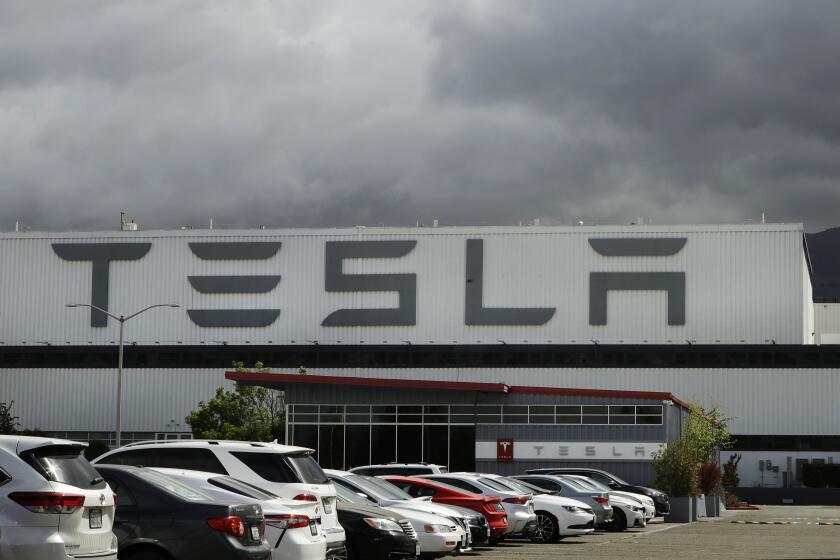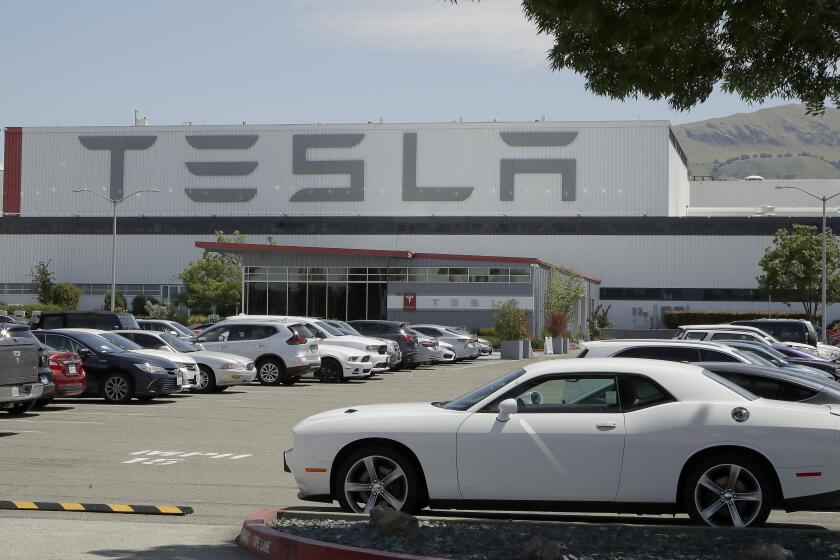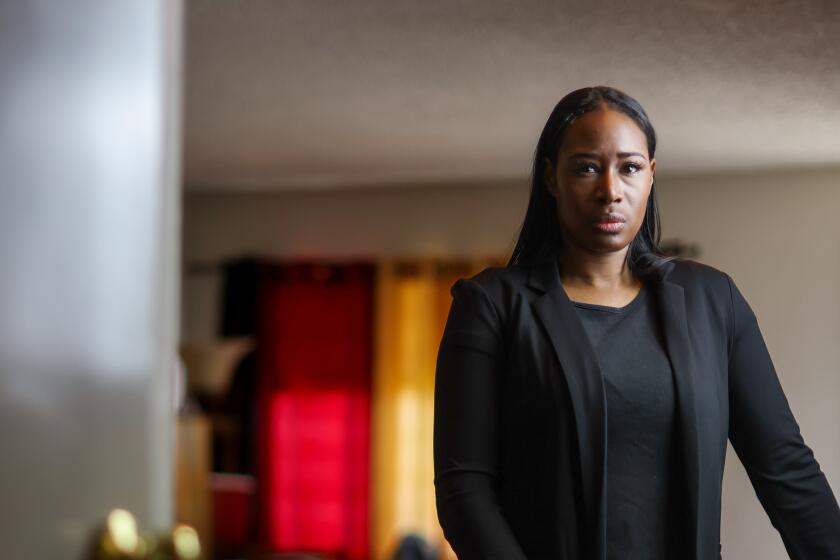San Francisco jury slashes Tesla’s $137-million racism suit tab

- Share via
A jury said Tesla Inc. owes $3.2 million to a Black former contract worker for failing to protect him from racial abuse — 98% less than a 2021 verdict in the same case.
The $137-million award that Owen Diaz won two years ago was among the highest ever for an individual suing over discrimination in the U.S. Diaz elected for a retrial on damages after a judge said the amount was too high and concluded $15 million was the most that the evidence in the case and the Constitution would allow.
Jurors in San Francisco federal court reached Monday’s verdict after about a day of deliberations.
At the close of the five-day retrial, a lawyer for Diaz asked the jury to award as much as $150 million in punitive damages — equal to 15% of Tesla’s cash flow at the time Diaz was subjected to racial slurs and graffiti at the plant in Fremont, Calif., about seven years ago.
Instead, the jury came back with $175,000 for economic losses and $3 million in punitive damages.
Tesla lost a trial in which it was accused of turning a blind eye to racial taunts and offensive graffiti at a Northern California plant.
“I don’t think the truth drove the decisions here,” Lawrence Organ, a lawyer for Diaz, said after the verdict. He said Diaz’s credibility was wrongly attacked by the defense during the trial and said he’s filed a request to the judge to grant a new trial due to “misconduct.” Tesla’s strategy was to “minimize and sanitize” and “it’s just sad that those antics worked,” he said.
Alex Spiro, a lawyer for Tesla, declined to comment.
Elon Musk’s company has faced years of complaints from Black workers that managers at the factory turned a blind eye to the commonplace use of racial slurs on the assembly line and were slow to clean up graffiti with swastikas and other hate symbols scrawled in common areas.
In a separate case, Tesla is fighting claims by California’s civil rights department that hundreds of African American workers at its factory were subject to mistreatment, including harassment, unequal pay and retaliation.
The original jury awarded Diaz $6.9 million for emotional distress and walloped Tesla with $130 million in punitive damages. A juror said afterward that the panel was sending a message to the company about using contract employees as a way to mitigate its own responsibility for the culture within its factories.
Racist slurs were hurled daily at Black workers at Tesla’s California plant, delivered not just by fellow employees but also by managers and supervisors, California’s civil rights agency alleges in an explosive lawsuit filed against the company Thursday.
Tesla called the 2021 verdict “staggering” and challenged it as excessive.
U.S. District Judge William Orrick later said he was compelled by legal principles to reduce the jury’s award but he also concluded there was ample “disturbing” evidence to support the outcome of the trial.
Jurors heard that the Tesla factory in Fremont “was saturated with racism,” Orrick wrote in his April 2022 ruling, adding that Diaz’s co-workers called him “the N-word and other slurs,” and that supervisors and Tesla’s broader management failed to help.
In the damages retrial, a lawyer for Diaz, J. Bernard Alexander, told jurors Friday that his client’s experience of a racist attack by a Tesla supervisor was sufficient for them to conclude the contractor had suffered, but that they had heard evidence of at least three such instances.
“Tesla had an obligation to do something about it, because they understand the consequences of a supervisor attacking an employee,” Alexander said.
In their own words, former Tesla employees describe what they call a racist work environment that led California to file a civil rights lawsuit against the company.
Turning to damages, the lawyer challenged the jury to be tough with Tesla.
“What is enough money to hold a multibillion-dollar company accountable, to get their attention?” Alexander said. “To get someone in the board room to understand that you do not treat your African American employees the way Mr. Diaz was treated?”
Spiro told jurors that punitive damages must be reasonable and proportionate. He reminded them it’s important that if they think a witness deliberately testified untruthfully, they don’t have to believe anything he said.
Diaz, he said, was caught in numerous lies, including his explanation that after leaving Tesla he went to work as a bus driver to escape the factory setting. In fact, he went to work in another factory for Coca-Cola, Spiro said.
“They’re throwing numbers up on the screen like this is some kind of game show,” he said, referring to the damages Alexander requested. Diaz’s dissembling about his work after Tesla was a lie “to get money dressed as virtue,” Spiro said. “Don’t reward that,” he added. “There are people really suffering. There’s people with real damages who tell the truth.”
Spiro, who wasn’t involved in Diaz’s 2021 trial, has become Musk’s go-to attorney for high-profile matters. He persuaded a jury this year to return a verdict in Musk’s favor in a securities fraud trial over the billionaire’s 2018 tweet about taking Tesla private. He also spearheaded Musk’s successful defense at a 2019 jury trial over defamation claims by a British cave diver whom the billionaire called “pedo guy” when the two traded insults on Twitter.
Inside the business of entertainment
The Wide Shot brings you news, analysis and insights on everything from streaming wars to production — and what it all means for the future.
You may occasionally receive promotional content from the Los Angeles Times.










